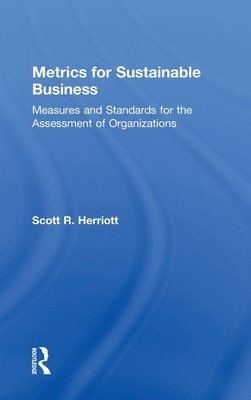
- We will send in 10–14 business days.
- Author: Scott Herriott
- Publisher: Routledge
- ISBN-10: 1138901717
- ISBN-13: 9781138901711
- Format: 15.2 x 22.9 x 1.6 cm, hardcover
- Language: English
- SAVE -10% with code: EXTRA
Reviews
Description
Metrics for Sustainable Business is the first book to give students a comprehensive understanding of sustainability in organizations from an accounting perspective. The book walks student through the steps for doing a sustainability assessment, and aims to develop them into financial analysts who understand sustainability reports, and are able to create or audit them.
While most books focus on environmental issues, Herriott trains his gaze on the corporate and institutional perspective, covering measurement systems, how to evaluate and improve a standard, and conducting a life cycle assessment. Walking students through the programs of disclosure, the varying standards for corporate ratings, and organizational certification, allows them to grasp the tools for conducting a sustainability assessment and auditing reports. Chapters on accounting for greenhouse gas emissions, water use, and waste introduce students to the technical details in sustainability accounting, while a chapter on the philosophies of sustainability offers an answer to the question, "Why are they asking us to report that?"
Richly demonstrated with practical examples and informative visuals, this book will serve students of sustainability, accounting, and integrated reporting.
EXTRA 10 % discount with code: EXTRA
The promotion ends in 20d.01:38:36
The discount code is valid when purchasing from 10 €. Discounts do not stack.
- Author: Scott Herriott
- Publisher: Routledge
- ISBN-10: 1138901717
- ISBN-13: 9781138901711
- Format: 15.2 x 22.9 x 1.6 cm, hardcover
- Language: English English
Metrics for Sustainable Business is the first book to give students a comprehensive understanding of sustainability in organizations from an accounting perspective. The book walks student through the steps for doing a sustainability assessment, and aims to develop them into financial analysts who understand sustainability reports, and are able to create or audit them.
While most books focus on environmental issues, Herriott trains his gaze on the corporate and institutional perspective, covering measurement systems, how to evaluate and improve a standard, and conducting a life cycle assessment. Walking students through the programs of disclosure, the varying standards for corporate ratings, and organizational certification, allows them to grasp the tools for conducting a sustainability assessment and auditing reports. Chapters on accounting for greenhouse gas emissions, water use, and waste introduce students to the technical details in sustainability accounting, while a chapter on the philosophies of sustainability offers an answer to the question, "Why are they asking us to report that?"
Richly demonstrated with practical examples and informative visuals, this book will serve students of sustainability, accounting, and integrated reporting.


Reviews